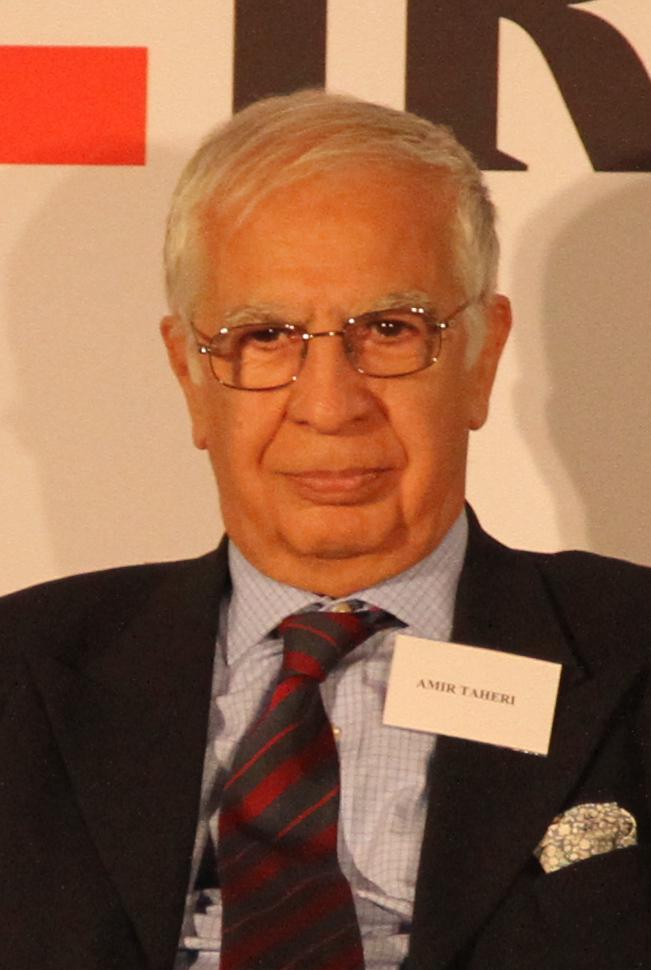Origine: Lo spirito di Allah, p. 43
Amir Taheri frasi celebri
Origine: Lo spirito di Allah, p. 9
Origine: Citato in Finto moderato contro vero duro: povero Iran http://www.ilgiornale.it/news/politica/finto-moderato-contro-vero-duro-povero-iran-1397921.html, Ilgiornale.it, 17 maggio 2017.
Origine: Citato in Coro persiano https://www.ilfoglio.it/articoli/2009/06/16/news/coro-persiano-70374/, Ilfoglio.it, 16 giugno 2009.
Amir Taheri: Frasi in inglese
What happens to Western values if no one stands up against Islam? http://nypost.com/2015/01/11/what-happens-to-western-values-if-no-one-stands-up-against-islam/, New York Post (January 11, 2015).
New York Post
"The Bhutto assassination: Democracy must go on" http://nypost.com/2007/12/28/the-bhutto-assassination-democracy-must-go-on/, New York Post (December 28, 2007).
New York Post
"The ugly attractions of ISIS’ ideology" http://nypost.com/2014/11/02/the-ugly-attractions-of-isis-ideology/, New York Post (November 2, 2014).
New York Post
Opinion: Turkey – Towards a “One and a Half Party” System http://english.aawsat.com/2016/08/article55355819/opinion-turkey-towards-one-half-party-system, Ashraq Al-Awsat (5 Aug, 2016).
"Why Pakistan needs Musharraf" http://nypost.com/2007/08/10/why-pakistan-needs-musharraf/, New York Post (August 10, 2007).
New York Post
When the Ayatollah Dictates Poetry http://www.aawsat.net/2015/07/article55344336/when-the-ayatollah-dictates-poetry, Ashraq Al-Awsat (Jul 11, 2015).
"The jihadis’ master plan to break us" http://nypost.com/2015/11/15/the-jihadis-master-plan-to-break-us/ New York Post (November 15, 2015).
New York Post
When the Ayatollah Dictates Poetry http://www.aawsat.net/2015/07/article55344336/when-the-ayatollah-dictates-poetry, Ashraq Al-Awsat (Jul 11, 2015).
"Have the Mullah's Abandoned their Dreams of Empire?", Elaph.com, (November 16, 2014).
"Assad must (still) go" http://nypost.com/2012/12/06/assad-must-still-go/, New York Post (December 6, 2012).
New York Post
Opinion: Clinton or Trump – Better or Less Bad? http://english.aawsat.com/2016/11/article55361471/opinion-clinton-trump-better-less-bad, Ashraq Al-Awsat (November 4, 2016)
"Brussels is what happens when liberals don’t push immigrants to integrate" http://nypost.com/2016/03/27/brussels-is-what-happens-when-liberals-dont-push-immigrants-to-integrate/ New York Post (March 27, 2016).
New York Post
The Unknown Life of the Shah (1991)
"Farewell Ataturk" http://nypost.com/2013/06/27/farewell-ataturk/, New York Post (June 27, 2013).
New York Post
Opinion: Clinton or Trump – Better or Less Bad? http://english.aawsat.com/2016/11/article55361471/opinion-clinton-trump-better-less-bad, Ashraq Al-Awsat (November 4, 2016)
Opinion: No, Bashar Al-Assad is no Joseph Stalin http://english.aawsat.com/2015/10/article55345413/opinion-no-bashar-al-assad-is-no-joseph-stalin, Ashraq Al-Awsat (16 Oct, 2015).
"Iraq: Reconciling with the Ba'ath" http://nypost.com/2008/01/16/iraq-reconciling-with-the-baath/, New York Post (January 16, 2008).
New York Post
Two excellent Persian translations are available.
When the Ayatollah Dictates Poetry http://www.aawsat.net/2015/07/article55344336/when-the-ayatollah-dictates-poetry, Ashraq Al-Awsat (Jul 11, 2015).
"Myths of our Afghanistan debate" http://nypost.com/2009/10/15/myths-of-our-afghanistan-debate/, New York Post (October 15, 2009).
New York Post
"Brussels is what happens when liberals don’t push immigrants to integrate" http://nypost.com/2016/03/27/brussels-is-what-happens-when-liberals-dont-push-immigrants-to-integrate/ New York Post (March 27, 2016).
New York Post
When the Ayatollah Dictates Poetry http://www.aawsat.net/2015/07/article55344336/when-the-ayatollah-dictates-poetry, Ashraq Al-Awsat (Jul 11, 2015).
"Myths of Mossadegh" https://www.nationalreview.com/nrd/articles/302213/myths-mossadegh/page/0/1, National Review (June 25, 2012).
"Iran's latest ethnic revolt" http://nypost.com/2008/01/14/irans-latest-ethnic-revolt/, New York Post (January 14, 2008).
New York Post
How ISIS is winning: The long reach of terror http://nypost.com/2015/02/05/how-isis-is-winning-the-long-reach-of-terror/, New York Post (February 5, 2015).
New York Post
Without the early Persian poets, Iranians might have ended up like so many other nations in the Middle East who lost their native languages and became Arabic speakers. Early on, Persian poets developed a strategy to check the ardor of the rulers and the mullahs. They started every qasida with praise to God and Prophet followed by panegyric for the ruler of the day. Once those “obligations” were out of the way they would move on to the real themes of the poems they wished to compose. Everyone knew that there was some trick involved but everyone accepted the result because it was good. Despite that modus vivendi some poets did end up in prison or in exile while many others spent their lives in hardship if not poverty. However, poets were never put to the sword. The Khomeinist regime is the first in Iran’s history to have executed so many poets. Implicitly or explicitly, some rulers made it clear what the poet couldn’t write. But none ever dreamt of telling the poet what he should write. Khamenei is the first to try to dictate to poets, accusing them of “crime” and” betrayal” if they ignored his injunctions.
When the Ayatollah Dictates Poetry http://www.aawsat.net/2015/07/article55344336/when-the-ayatollah-dictates-poetry, Ashraq Al-Awsat (Jul 11, 2015).
